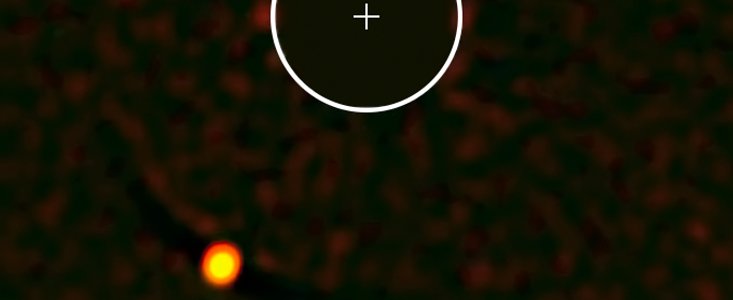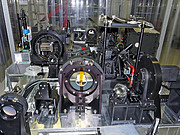Mededeling
ESO’s SPHERE ontdekt een unieke exoplaneet
6 juli 2017
Een van de meest uitdagende en opwindende terreinen van de moderne astronomie is de jacht op exoplaneten – andere werelden die om andere sterren draaien. Onlangs is met het Spectro-Polarimetric High-contrast Exoplanet REsearch instrument – kortweg SPHERE – van ESO’s Very Large Telescope (VLT) een nieuwe exoplaneet opgespoord: HIP 65426b. Deze planeet, die ongeveer 385 lichtjaar van ons verwijderd is, is de eerste die SPHERE heeft ontdekt [1] – en het blijkt om een bijzonder interessant exemplaar te gaan.
Met een temperatuur van 1000 tot 1400 graden Celsius is de planeet, die zes tot twaalf keer zoveel massa heeft als Jupiter, behoorlijk warm. Hij lijkt te zijn gehuld in een zeer stoffige atmosfeer met dikke bewolking, en draait om een hete, jonge ster die verrassend snel om zijn as wentelt. De ster lijkt niet te zijn omringd door een schijf van puin, wat merkwaardig is voor zijn leeftijd. Het ontbreken van deze schijf roept de vraag op hoe de planeet überhaupt is ontstaan.
Eén mogelijkheid is dat de planeet zich heeft gevormd in een schijf van gas en stof waarna, toen de schijf snel vervloog, interacties met andere planeten ervoor hebben gezorgd dat hij in zijn huidige wijde omloopbaan terechtkwam. Maar het is ook denkbaar dat de ster en de planeet tezamen zijn gevormd als een soort dubbelster waarin de zwaarste van de twee zijn lichtere soortgenoot ervan heeft weerhouden om voldoende materie te verzamelen om een echte ster te worden. De ontdekking van de planeet biedt astronomen de mogelijkheid om de samenstelling en verdeling van wolken in zijn atmosfeer te onderzoeken, en theorieën over het ontstaan, de evolutie en de fysica van exoplaneten te toetsen.
SPHERE is een krachtige planetenjager die gekoppeld is aan Unit Telescope 3 van de VLT. Zijn wetenschappelijke doel is het detecteren en onderzoeken van nieuwe grote exoplaneten bij nabije sterren met behulp van direct imaging [2]. Deze methode is erop gericht om rechtstreekse opnamen te maken van exoplaneten en puinschijven rond sterren, ongeveer zoals je een foto maakt. Dat is geen eenvoudige opgave, omdat het licht van een ster zo fel is, dat het zwakke weerkaatste licht van daaromheen draaiende planeten daarbij verbleekt. SPHERE is ontworpen om dit obstakel te omzeilen en specifiek te kijken naar het gepolariseerde licht dat door het oppervlak van een planeet is weerkaatst.
Deze opname is gemaakt in het kader van een onderzoeksprogramma dat SHINE (SpHere INfrared survey for Exoplanets) heet. SHINE streeft ernaar om nabij-infraroodopnamen te maken van 600 nabije sterren en het sterke contrast en oplossend vermogen van SPHERE te benutten voor het ontdekken en bestuderen van nieuwe planetenstelsels.
Noten
[1] In een vorig ESO-persbericht is sprake van een eerdere SPHERE-ontdekking die voor een planeet werd aangezien. Over deze waarneming zijn echter twijfels ontstaan. Vandaar dat HIP 65426b momenteel de eerste betrouwbare detectie van een exoplaneet door SPHERE is.
[2] Bij de jacht op exoplaneten kunnen astronomen over tal van hulpmiddelen beschikken. Veel planeetopsporingsmethoden zijn indirect: astronomen kunnen de karakteristieke ‘dip’ in de helderheid van een ster detecteren wanneer daar een planeet voorlangs schuift of de kleine schommeling meten die in ster vertoont wanneer er planeten omheen draaien. Daarnaast bestaat er echter ook een manier om planeten rechtstreeks op te sporen: direct imaging.
Links
Contact
Gaël Chauvin
Institut de Planetologie et d'Astrophysique de Grenoble (IPAG)
BP 53, 38041 Grenoble Cedex 9, France
Tel: +33 6 4551 8209
Email: gael.chauvin@univ-grenoble-alpes.fr
Jean-Luc Beuzit
Institut de Planetologie et d'Astrophysique de Grenoble (IPAG)
BP 53, 38041 Grenoble Cedex 9, France
Tel: +33 6 8739 6285
Email: jean-luc.beuzit@univ-grenoble-alpes.fr
Richard Hook
ESO Public Information Officer
Garching bei München, Germany
Tel: +49 89 3200 6655
Cell: +49 151 1537 3591
Email: rhook@eso.org
Over de Mededeling
| Id: | ann17041 |
Our use of Cookies
We use cookies that are essential for accessing our websites and using our services. We also use cookies to analyse, measure and improve our websites’ performance, to enable content sharing via social media and to display media content hosted on third-party platforms.
ESO Cookies Policy
The European Organisation for Astronomical Research in the Southern Hemisphere (ESO) is the pre-eminent intergovernmental science and technology organisation in astronomy. It carries out an ambitious programme focused on the design, construction and operation of powerful ground-based observing facilities for astronomy.
This Cookies Policy is intended to provide clarity by outlining the cookies used on the ESO public websites, their functions, the options you have for controlling them, and the ways you can contact us for additional details.
What are cookies?
Cookies are small pieces of data stored on your device by websites you visit. They serve various purposes, such as remembering login credentials and preferences and enhance your browsing experience.
Categories of cookies we use
Essential cookies (always active): These cookies are strictly necessary for the proper functioning of our website. Without these cookies, the website cannot operate correctly, and certain services, such as logging in or accessing secure areas, may not be available; because they are essential for the website’s operation, they cannot be disabled.
Functional Cookies: These cookies enhance your browsing experience by enabling additional features and personalization, such as remembering your preferences and settings. While not strictly necessary for the website to function, they improve usability and convenience; these cookies are only placed if you provide your consent.
Analytics cookies: These cookies collect information about how visitors interact with our website, such as which pages are visited most often and how users navigate the site. This data helps us improve website performance, optimize content, and enhance the user experience; these cookies are only placed if you provide your consent. We use the following analytics cookies.
Matomo Cookies:
This website uses Matomo (formerly Piwik), an open source software which enables the statistical analysis of website visits. Matomo uses cookies (text files) which are saved on your computer and which allow us to analyze how you use our website. The website user information generated by the cookies will only be saved on the servers of our IT Department. We use this information to analyze www.eso.org visits and to prepare reports on website activities. These data will not be disclosed to third parties.
On behalf of ESO, Matomo will use this information for the purpose of evaluating your use of the website, compiling reports on website activity and providing other services relating to website activity and internet usage.
Matomo cookies settings:
Additional Third-party cookies on ESO websites: some of our pages display content from external providers, e.g. YouTube.
Such third-party services are outside of ESO control and may, at any time, change their terms of service, use of cookies, etc.
YouTube: Some videos on the ESO website are embedded from ESO’s official YouTube channel. We have enabled YouTube’s privacy-enhanced mode, meaning that no cookies are set unless the user actively clicks on the video to play it. Additionally, in this mode, YouTube does not store any personally identifiable cookie data for embedded video playbacks. For more details, please refer to YouTube’s embedding videos information page.
Cookies can also be classified based on the following elements.
Regarding the domain, there are:
- First-party cookies, set by the website you are currently visiting. They are stored by the same domain that you are browsing and are used to enhance your experience on that site;
- Third-party cookies, set by a domain other than the one you are currently visiting.
As for their duration, cookies can be:
- Browser-session cookies, which are deleted when the user closes the browser;
- Stored cookies, which stay on the user's device for a predetermined period of time.
How to manage cookies
Cookie settings: You can modify your cookie choices for the ESO webpages at any time by clicking on the link Cookie settings at the bottom of any page.
In your browser: If you wish to delete cookies or instruct your browser to delete or block cookies by default, please visit the help pages of your browser:
Please be aware that if you delete or decline cookies, certain functionalities of our website may be not be available and your browsing experience may be affected.
You can set most browsers to prevent any cookies being placed on your device, but you may then have to manually adjust some preferences every time you visit a site/page. And some services and functionalities may not work properly at all (e.g. profile logging-in, shop check out).
Updates to the ESO Cookies Policy
The ESO Cookies Policy may be subject to future updates, which will be made available on this page.
Additional information
For any queries related to cookies, please contact: pdprATesoDOTorg.
As ESO public webpages are managed by our Department of Communication, your questions will be dealt with the support of the said Department.


